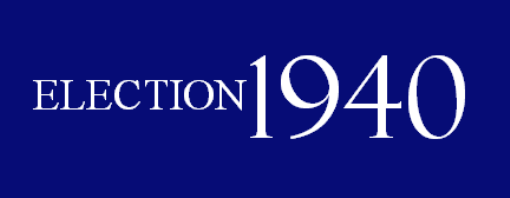The Pittsburgh Press (October 28, 1940)
ISSUE OF WAR TOPS OTHERS IN FINAL DRIVE
…
Third Term Also Major Question With Election Only a Week Away
…
By Lyle C. Wilson, United Press Staff Writer
Washington, Oct. 28 –

Franklin D. Roosevelt and Wendell L. Willkie hit their campaign peaks today as they entered the stretch period of the hardest fought presidential contest since 1916. In that year, Woodrow Wilson defeated Charles Evans Hughes by the margin of a few late returns from California.
Coincident with the campaign windup, the capital is preparing for the grim business of another draft for military training, the first in our peacetime history.
War Issue Raised
But the nation is flaming from coast to coast with dispute whether one or the other of the candidates would be less likely to lead the country into war.
The third term is another tremendous issue along with questions of more or less government regulation of business, spending and the comparative ability of the two candidates to administer the vast business of government and to unify the effort of the nation for defense and economic advancement.
Class and racial voting blocs are judged to be acutely important. Labor is split wide open with President John L. Lewis of the Congress of Industrial Organizations backing Mr. Willkie and some of his own followers and most of the American Federation of Labor High Command either openly endorsing Mr. Roosevelt or obviously leaning toward him.
Close Vote Seen
No recent presidential campaign is comparable to this one for week-before-election day indications of a close popular vote. Mr.; Roosevelt swamped Alf M. Landon four years ago by 27,476,600 votes to 16,679,000 and in 1932 polled 22,821,000 to 15,761,000 for Herbert C. Hoover.
Mr. Hoover gave Alfred E. Smith a classic beating in 1928, 21,392,000 to 15,016,000. John W. Davis’ lost because in 1924 polled 8,385,000 votes to 15,725,000 for Calvin Coolidge and the 1920 count was: Harding, 16,152,000; Cox, 9,147,000.
But 24 years ago, it was a horse race: Wilson, 9,129,000; Hughes, 8,538,000. It was not until a full day after the polls closed that belated returns from California shifted that state from Mr. Hughes to Mr. Wilson, giving the former the election.
Million May Decide
James A. Farley, who resigned as Postmaster General and as Chairman of the Democratic National Committee because he would not manage a third term campaign but who will vote for the Roosevelt-Wallace ticket, nevertheless, believes the popular vote difference this year may be a million votes or fewer.
Political managers are taking no chances. Mr. Roosevelt’s decision to devote the final fortnight before election to an active and avowed campaign was in response to the pressure of party leaders.
The Negro vote is urgently desired by both sides. Mr. Farley once estimated that Negroes were the balance of power in almost any election at least in Pennsylvania, Ohio, Indiana, New York, Michigan, Missouri, Kentucky and Tennessee. Those states cast 179 electoral votes.
Negro Becomes General
In a single day last week, Mr. Roosevelt announced the nomination of the first Negro officer in the history of the U.S. Army – Colonel Benjamin O. Davis…to be brigadier.
Two members of the Howard University (Negro) faculty were named to important national defense posts, one of them to be civilian aide to the Secretary of War. Mrs. Roosevelt entertained a large group of Negro men and women at a White House tea.